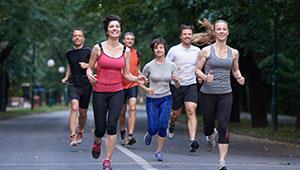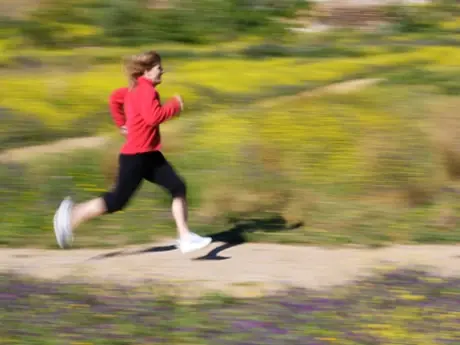"By adapting, I mean that the runner should become a little bit better at running—he or she should feel less winded, and the activity shouldn't feel as difficult when running at an easy, conversational pace," says Forsman. "It doesn't mean that running will become a cake walk, but you should feel less fatigue, soreness and less out of breath."
However, if you're older—in your late 30s, 40s or 50s and beyond—it will naturally take the body longer to adapt to the stress of running; it might take 4 to 6 weeks of consistent training for running to feel easier. The same timeframe can apply to heavier runners—they simply have more to lift, and their feet, joints, bones and tendons are absorbing more impact with each footstrike. This shouldn't be a deterrent for overweight beginners, but more of a reality check. The activity will start to feel easier, it just might take a little longer.
More: 4 Ways to Run Faster After Age 40
"The act of running generates 3 to 5 times your body weight in impact force per footstrike," says Forsman. "Your bones have to get harder, your muscles need to adapt and get stronger, and you can't rush that process."
5 Tips to Become a Consistent Runner
There are, however, things that new runners can do to ease the transition from the hard first day of running to the day when running starts to feel less laborious weeks into the program. Establish the following habits now to ensure that running consistently becomes a part of your lifestyle, and you hopefully won't get sidelined with injury or burnout as much as others who don't follow this advice.
More: How to Find Your Weaknesses as a Runner and Avoid Injury
Keep Your Expectations Realistic
Running is a high-impact, taxing activity, and your body needs time to adapt to the new stress. You will adjust, and it will get easier, but it will take your body as long as it needs to go through the adaptation process.
The same is true for progression—just because you and your friend started training with your charity fundraising group at the same time doesn't mean that you both will progress at exactly the same rate. She may adapt more quickly than you, and be ready for more before you, and vice versa. Be patient, stick with it, follow the rest of the steps below, and you'll improve when your body is ready.
- 2
- of
- 3
About the Author

Get ACTIVE on the Go


Couch to 5K®
The best way to get new runners off the couch and across the finish line of their first 5K.
Available for iOS | Android







Discuss This Article